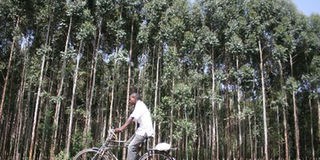Kisii farmers reluctant to uproot eucalyptus trees due to impressive profits

A eucalyptus plantation. Farmers in Kisii County have been reluctant to uproot the trees growing near river banks. They argue that they earm more money from the trees than from maize. FILE PHOTO | JARED NYATAYA | NATION MEDIA GROUP
What you need to know:
- Mr Fred Kebaya says he resorted to planting the trees after realising he could make more money from them.
- WRMA sub regional manager said they will not shy away from enforcing their mandate of protecting water sources in the country.
- He said they had not banned the farmers from planting the trees but were simply discouraging them from doing so next to water sources.
- He says even though the trees were good commercially, farmers should be sensitised not to plant them near water sources.
Farmers living along river banks in Kisii County are faced with a major dilemma over a government directive to uproot eucalyptus trees.
They are wondering whether to heed a government directive on the trees that have been blamed for high water consumption in wetlands or keep them and make money.
Mr Fred Kebaya, a farmer from Miruka in Kisii County, says he resorted to planting the trees after realising he could make more money from them.
And the beauty of it was they were growing just right outside his homestead, on his farm situated along the river bank.
“One mature eucalyptus tree, when harvested, fetches more money at local timber yards than an acre of maize crop,” he claims.
“One tree can fetch up to Sh35,000. Imagine if you have several of these trees in your one-acre plot.
“You will not get this kind of money even if you harvest ten 90kg bags of maize from the same parcel of land. The growing of these trees is therefore a rather lucrative business,” he adds.
The farmers are thus opposed to the move by the Water Resources Management Authority (WRMA) to uproot the trees.
INTERFERE WITH WATER SOURCES
However, officials from the authority defended the move, saying continued planting of such trees along river banks had been outlawed as they interfered with water sources.
Mr Bilancio Maturwe, WRMA sub-regional manager, said they would not shy away from enforcing their mandate of protecting water sources in the country.
“The public should be informed that the exercise is for their own good and no one should mislead them that we are out to deprive them of a living,” said the official.
He said they had not banned the farmers from planting the trees but were simply discouraging them from doing so next to water sources.
Mr Maturwe said they had consequently established 10 water-user associations to sensitise the farmers on the dangers of planting the trees near water catchment areas.
“A mature eucalyptus tree can consume up to 1,200 litres of water a day.
"You can therefore imagine the impact from a farmer who has 10 mature trees next to a river,” he says.
GIVE NOTICE TO FARMERS
He reveals that they normally give notices to farmers before cutting down the trees.
“I want to encourage farmers to plant indigenous trees along the rivers instead of eucalyptus,” he says.
Similar sentiments were also made by Mr Gilbert Imbwaga, the head of the forestry department in Kisii County.
He says even though the trees were good commercially, farmers should be sensitised not to plant them near water sources.
He also advised the farmers to consider planting bamboo trees, which consume little water but with great financial returns.
It is feared that in 10 years the whole of Gusii region and its environs could be faced with an acute water shortage due to the farming of the eucalyptus trees and other commercial activities.
Mr Sam Bokea, the area National Environmental Management Authority director, says: “Eucalyptus trees in Kisii and Nyamira have greatly contributed to the drying up of rivers and their tributaries in the area.
“It should be noted that water levels in our region have gone down during the three months that we have gone without rain and eucalyptus trees that are planted next to the rivers are a major cause because their roots can go up 90 feet just to reach water,” he adds.
Robert Maina, the Kiamokama Tea Factory manager, said they did not specifically require eucalyptus as a source of fuel in the factories but farmers prefer them because they mature faster.
“We use firewood because it is cost-effective but we do not specify which type of trees we require,” he says.




